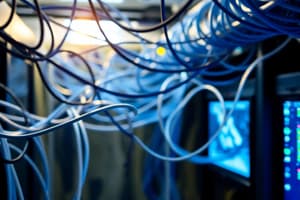Podcast
Questions and Answers
What is the purpose of protocols in networking?
What is the purpose of protocols in networking?
- To manage physical device connections.
- To govern message formatting, timing, delivery, and acknowledgment. (correct)
- To create user interfaces for applications.
- To enhance the visual appearance of network devices.
Which layer of data encapsulation deals with the application data?
Which layer of data encapsulation deals with the application data?
- Data Link Layer
- Transport Layer
- Application Layer (correct)
- Network Layer
Which IP address characteristic is essential for end-to-end delivery?
Which IP address characteristic is essential for end-to-end delivery?
- It needs to be easy to remember.
- It must be globally unique. (correct)
- It should be static.
- It should be shared across multiple devices.
What is the main goal of network security?
What is the main goal of network security?
Which of the following is a characteristic of a LAN?
Which of the following is a characteristic of a LAN?
What does the acronym BYOD stand for?
What does the acronym BYOD stand for?
Which of the following layers is NOT part of the OSI model?
Which of the following layers is NOT part of the OSI model?
Which address range is associated with private networks?
Which address range is associated with private networks?
What does CIDR stand for in networking?
What does CIDR stand for in networking?
Which of the following IP addresses is used for the loopback?
Which of the following IP addresses is used for the loopback?
What is one of the main purposes of subnetting?
What is one of the main purposes of subnetting?
How does subnetting affect the number of hosts per subnet?
How does subnetting affect the number of hosts per subnet?
Which ICMP message indicates that a destination is unreachable?
Which ICMP message indicates that a destination is unreachable?
What is the purpose of the 'ping' command?
What is the purpose of the 'ping' command?
What is the subnet mask for a /24 network?
What is the subnet mask for a /24 network?
Which class of IP addresses is generally used for large networks?
Which class of IP addresses is generally used for large networks?
What happens when DHCP fails for IP address assignment?
What happens when DHCP fails for IP address assignment?
What is a primary function of a default static route?
What is a primary function of a default static route?
Which of the following best describes link-state protocols?
Which of the following best describes link-state protocols?
What defines a floating static route?
What defines a floating static route?
Which advantage is associated with dynamic routing protocols?
Which advantage is associated with dynamic routing protocols?
What distinguishes classless protocols from classful protocols?
What distinguishes classless protocols from classful protocols?
What is the maximum number of hosts per subnet in a /25 network?
What is the maximum number of hosts per subnet in a /25 network?
Which subnet mask should be used for a subnet that requires 50 hosts?
Which subnet mask should be used for a subnet that requires 50 hosts?
What does VLSM stand for?
What does VLSM stand for?
What is the primary advantage of using manual routes in the routing table?
What is the primary advantage of using manual routes in the routing table?
How many subnets can be created by borrowing 3 bits from a /24 network?
How many subnets can be created by borrowing 3 bits from a /24 network?
What is the formula to calculate the number of hosts per subnet?
What is the formula to calculate the number of hosts per subnet?
Which of the following is NOT a typical reason for structured addressing?
Which of the following is NOT a typical reason for structured addressing?
What is the magic number for a /26 subnet?
What is the magic number for a /26 subnet?
What is one of the disadvantages of manually configured routes?
What is one of the disadvantages of manually configured routes?
Why is proper documentation important in network management?
Why is proper documentation important in network management?
What is the primary purpose of Cisco IOS?
What is the primary purpose of Cisco IOS?
Which access method is considered secure for remote access in Cisco IOS?
Which access method is considered secure for remote access in Cisco IOS?
In which command mode can you configure global settings on a Cisco device?
In which command mode can you configure global settings on a Cisco device?
What does the command 'enable' do in Cisco IOS?
What does the command 'enable' do in Cisco IOS?
Which of the following characteristics describes IPv4?
Which of the following characteristics describes IPv4?
What is the function of the Time To Live (TTL) field in an IPv4 header?
What is the function of the Time To Live (TTL) field in an IPv4 header?
Which command saves the current configuration to NVRAM in Cisco IOS?
Which command saves the current configuration to NVRAM in Cisco IOS?
What does media independent mean in the context of IP?
What does media independent mean in the context of IP?
Which mode is used to configure specific ports on a Cisco device?
Which mode is used to configure specific ports on a Cisco device?
A WAN connects devices within a small geographic area such as a home or office.
A WAN connects devices within a small geographic area such as a home or office.
The Internet is a global collection of WANs and LANs.
The Internet is a global collection of WANs and LANs.
Intermediary devices help manage data flow in a network.
Intermediary devices help manage data flow in a network.
Quality of Service (QoS) refers to the capacity for networks to grow without performance loss.
Quality of Service (QoS) refers to the capacity for networks to grow without performance loss.
BYOD stands for Bring Your Own Device, allowing employees to use their personal devices for work.
BYOD stands for Bring Your Own Device, allowing employees to use their personal devices for work.
Fault tolerance refers to the capability of a network to reduce redundancy and minimize failures.
Fault tolerance refers to the capability of a network to reduce redundancy and minimize failures.
A Network Interface Card (NIC) connects a device to a network.
A Network Interface Card (NIC) connects a device to a network.
IPv6 addresses are 64-bit numbers.
IPv6 addresses are 64-bit numbers.
The default gateway connects a local network to external networks.
The default gateway connects a local network to external networks.
RAM in a router stores the startup configuration.
RAM in a router stores the startup configuration.
Local routes in a router routing table represent IP addresses assigned to interfaces.
Local routes in a router routing table represent IP addresses assigned to interfaces.
A multicast address enables one-to-one communication.
A multicast address enables one-to-one communication.
The formula to calculate the number of hosts per subnet is $2h - 2$.
The formula to calculate the number of hosts per subnet is $2h - 2$.
Dynamic routing protocols help learn remote routes through manual configuration.
Dynamic routing protocols help learn remote routes through manual configuration.
A /27 subnet allows for 62 hosts per subnet.
A /27 subnet allows for 62 hosts per subnet.
The IOS is stored in NVRAM.
The IOS is stored in NVRAM.
POST stands for Power On Self Test and runs diagnostics during router boot-up.
POST stands for Power On Self Test and runs diagnostics during router boot-up.
VLSM allows for subnets of the same size to optimize IP usage.
VLSM allows for subnets of the same size to optimize IP usage.
Private IPv4 addresses are routable on the internet.
Private IPv4 addresses are routable on the internet.
A subnet mask of /24 can accommodate 256 addresses in total.
A subnet mask of /24 can accommodate 256 addresses in total.
The magic number for a /26 subnet is 64.
The magic number for a /26 subnet is 64.
IPv4 addresses consist of 8 octets.
IPv4 addresses consist of 8 octets.
Borrowing 3 bits from a /24 network creates 4 subnets.
Borrowing 3 bits from a /24 network creates 4 subnets.
Proper planning and documentation are essential for managing networks.
Proper planning and documentation are essential for managing networks.
End-user devices typically use static IP addresses to connect to the network.
End-user devices typically use static IP addresses to connect to the network.
Manual routes in routing tables are always scalable for growing networks.
Manual routes in routing tables are always scalable for growing networks.
A Default Static Route is used to forward all packets without a more specific match.
A Default Static Route is used to forward all packets without a more specific match.
Distance-Vector Protocols provide a complete view of the network topology.
Distance-Vector Protocols provide a complete view of the network topology.
Static routes automatically adapt to network changes without the need for manual configuration.
Static routes automatically adapt to network changes without the need for manual configuration.
Link-State Protocols use algorithms like Dijkstra's to compute the shortest path.
Link-State Protocols use algorithms like Dijkstra's to compute the shortest path.
Classful protocols send subnet mask information with routing updates.
Classful protocols send subnet mask information with routing updates.
Cisco IOS provides a Graphical User Interface (GUI) for device management.
Cisco IOS provides a Graphical User Interface (GUI) for device management.
The 'enable' command is used to enter privileged EXEC mode in Cisco IOS.
The 'enable' command is used to enter privileged EXEC mode in Cisco IOS.
In Cisco IOS, the Global Configuration Mode is used to view only basic commands.
In Cisco IOS, the Global Configuration Mode is used to view only basic commands.
Telnet is considered a secure method for remote access in network administration.
Telnet is considered a secure method for remote access in network administration.
The purpose of the Network Layer is to handle addressing, encapsulation, routing, and de-encapsulation.
The purpose of the Network Layer is to handle addressing, encapsulation, routing, and de-encapsulation.
IPv6 uses a similar addressing scheme as IPv4, including the same header fields.
IPv6 uses a similar addressing scheme as IPv4, including the same header fields.
The 'exit' command in Cisco IOS is used to save changes to the startup configuration.
The 'exit' command in Cisco IOS is used to save changes to the startup configuration.
IPv4 is a connection-oriented protocol, requiring a connection to be established before sending packets.
IPv4 is a connection-oriented protocol, requiring a connection to be established before sending packets.
Best Effort Delivery is a characteristic of IPv4 that ensures guaranteed packet delivery.
Best Effort Delivery is a characteristic of IPv4 that ensures guaranteed packet delivery.
Flashcards
Network Protocol
Network Protocol
A set of rules that govern how data is formatted, timed, delivered, and acknowledged across a network.
Data Encapsulation
Data Encapsulation
Wrapping data in multiple layers of headers and trailers before it travels across a network.
IP Address
IP Address
A unique numerical address that identifies a device on a network for end-to-end delivery.
OSI Model
OSI Model
Signup and view all the flashcards
TCP/IP Model
TCP/IP Model
Signup and view all the flashcards
LAN
LAN
Signup and view all the flashcards
WAN
WAN
Signup and view all the flashcards
Cisco IOS Purpose
Cisco IOS Purpose
Signup and view all the flashcards
Console Port Access
Console Port Access
Signup and view all the flashcards
SSH Access
SSH Access
Signup and view all the flashcards
IP Protocol
IP Protocol
Signup and view all the flashcards
Connectionless Protocol
Connectionless Protocol
Signup and view all the flashcards
Best Effort Delivery
Best Effort Delivery
Signup and view all the flashcards
Enable Secret Password
Enable Secret Password
Signup and view all the flashcards
IP Versioning in Packets
IP Versioning in Packets
Signup and view all the flashcards
TTL in IP Packet
TTL in IP Packet
Signup and view all the flashcards
Subnet Mask
Subnet Mask
Signup and view all the flashcards
CIDR
CIDR
Signup and view all the flashcards
Subnetting
Subnetting
Signup and view all the flashcards
Subnet
Subnet
Signup and view all the flashcards
Network Portion
Network Portion
Signup and view all the flashcards
Host Portion
Host Portion
Signup and view all the flashcards
Number of Subnets
Number of Subnets
Signup and view all the flashcards
Borrowed Bits
Borrowed Bits
Signup and view all the flashcards
Slash Notation (/24)
Slash Notation (/24)
Signup and view all the flashcards
Host Bits
Host Bits
Signup and view all the flashcards
How many hosts per subnet?
How many hosts per subnet?
Signup and view all the flashcards
Structured Addressing
Structured Addressing
Signup and view all the flashcards
Magic Number
Magic Number
Signup and view all the flashcards
Static Routing
Static Routing
Signup and view all the flashcards
Advantages of Static Routing
Advantages of Static Routing
Signup and view all the flashcards
Default Static Route
Default Static Route
Signup and view all the flashcards
Floating Static Route
Floating Static Route
Signup and view all the flashcards
Dynamic Routing Protocol
Dynamic Routing Protocol
Signup and view all the flashcards
Distance-Vector Protocol
Distance-Vector Protocol
Signup and view all the flashcards
Link-State Protocol
Link-State Protocol
Signup and view all the flashcards
What are the essential components for network communication?
What are the essential components for network communication?
Signup and view all the flashcards
What are the types of networks?
What are the types of networks?
Signup and view all the flashcards
What are 'end devices' and 'intermediary devices' in a network?
What are 'end devices' and 'intermediary devices' in a network?
Signup and view all the flashcards
What is fault tolerance in network architecture?
What is fault tolerance in network architecture?
Signup and view all the flashcards
What is scalability in network architecture?
What is scalability in network architecture?
Signup and view all the flashcards
Quality of Service (QoS) in network architecture?
Quality of Service (QoS) in network architecture?
Signup and view all the flashcards
What are some common security threats for networks?
What are some common security threats for networks?
Signup and view all the flashcards
Cisco IOS
Cisco IOS
Signup and view all the flashcards
Secure Shell (SSH)
Secure Shell (SSH)
Signup and view all the flashcards
Privileged EXEC Mode
Privileged EXEC Mode
Signup and view all the flashcards
Global Configuration Mode
Global Configuration Mode
Signup and view all the flashcards
Interface Mode
Interface Mode
Signup and view all the flashcards
IPv4 vs. IPv6
IPv4 vs. IPv6
Signup and view all the flashcards
TTL (Time To Live)
TTL (Time To Live)
Signup and view all the flashcards
Subnetting Purpose
Subnetting Purpose
Signup and view all the flashcards
Hosts per Subnet
Hosts per Subnet
Signup and view all the flashcards
VLSM (Variable Length Subnet Mask)
VLSM (Variable Length Subnet Mask)
Signup and view all the flashcards
What are the IPv6 Header Enhancements?
What are the IPv6 Header Enhancements?
Signup and view all the flashcards
What is a default gateway?
What is a default gateway?
Signup and view all the flashcards
Host Routing Table
Host Routing Table
Signup and view all the flashcards
Router Routing Table
Router Routing Table
Signup and view all the flashcards
Router Memory Types
Router Memory Types
Signup and view all the flashcards
What is the purpose of LAN/WAN interfaces?
What is the purpose of LAN/WAN interfaces?
Signup and view all the flashcards
Router Boot-up Process
Router Boot-up Process
Signup and view all the flashcards
IPv4 Address Structure
IPv4 Address Structure
Signup and view all the flashcards
What is a subnet mask?
What is a subnet mask?
Signup and view all the flashcards
What are the different types of IPv4 Addresses?
What are the different types of IPv4 Addresses?
Signup and view all the flashcards
Study Notes
Chapter 1 Introduction to Networks
- Networks connect devices globally for communication, learning, work, and entertainment.
- Communication methods include texting, social media, online collaboration, blogs, and gaming.
Types of Networks
- LAN (Local Area Network): Covers small areas like homes, offices, or campuses. High-speed bandwidth, single administration.
- WAN (Wide Area Network): Connects LANs across large areas (cities, countries). Managed by multiple service providers, slower speeds than LANs.
- Internet: A global network of interconnected LANs and WANs using copper, fiber optic, and wireless media.
Network Components
- End Devices: Devices that originate or receive messages, such as computers and phones.
- Intermediary Devices: Manage data flow (e.g., routers, switches, firewalls).
- Media Types: Copper cables, fiber optics, and wireless.
Network Architectures
- Fault Tolerance: Redundancy in a network to minimize failures. Provides reliability.
Chapter 2 Configuring a Network Operating System
-
Cisco IOS: The operating system for network devices (routers, switches) providing command-line interfaces for management.
-
Access Methods: Console port (direct physical access), Secure Shell (SSH) (encrypted remote access), and Telnet (not secure, avoid use).
-
Command Modes: User EXEC (basic view-only), Privileged EXEC (advanced commands), and Global Configuration (device-wide settings) with sub-configurations to modify specific ports or access methods.
-
Important Commands include
enable,configure terminal,exit,copy running-config startup-config, anderase startup-config. -
Security Configuration: Uses passwords to secure privileged and console access (e.g.,
enable secret [password]).
Chapter 3 Network Layer Overview
- Network Layer Purpose: Handles end-to-end communication, addressing, encapsulation, routing, and de-encapsulation.
- Protocols: IPv4 and IPv6 are commonly used.
- Characteristics of IP: Connectionless protocol (no prior connection required), best-effort delivery (no guarantee of packet order or delivery), and media independent (operates over various media).
- IPv4 Header Fields: Includes version, time-to-live (TTL), source/destination IP address.
Chapter 4 IPv4 Addressing Basics
- IPv4 Structure: 32-bit binary numbers divided into 4 octets (e.g., 192.168.1.1).
- Network, Host, and Subnet Mask portions: Used to segment network and device identification.
- Address Types:
- Unicast (one-to-one communication),
- Broadcast (one-to-all communication),
- Multicast (one-to-a-group communication).
- Address Categories: Public addresses (routable on the internet) and private addresses (not routable). IPv4 Classes (Class A, Class B, Class C) and address ranges. Special use addresses for loopback, link-local, and testing.
Chapter 5 Subnetting
- Subnetting: Divides a larger network into smaller subnets.
- Subnetting principles include network portion, host portion, and subnet mask.
- Subnetting allows for better resource management, improves performance and manageability, enables security using isolation.
- Formulas to calculate the number of subnets and hosts per subnet depending upon the bits borrowed for subnetting.
- Variable Length Subnet Masking (VLSM) and its benefits for using flexible subnet masks.
- The concepts for logically assigning and separating IP addresses, by location, device type, etc.
Chapter 6 Static Routing
- Static Routing definition and manual route configuration benefits.
- Types of static routes: The basic static route for direct forwarding to a specific network and the default static route (gateway of last resort), that handles packets to unspecified destinations. The concept of floating routes (backup).
- Use cases: Appropriate for small networks, stub networks, and situations requiring predictable paths.
- Basic commands for configuring static routes.
Chapter 7 Dynamic Routing
- Dynamic routing protocols discover and maintain routing information automatically.
- Advantages of Dynamic routing: Reduced administrative overhead, flexible adaptation to topology changes, suitable for large and complex networks.
- Disadvantages of Dynamic Routing: Requires router resources; can be slower, and error prone.
- Types of Dynamic Routing Protocols:
- Distance-Vector protocols (e.g., RIP, EIGRP): Share routing updates with neighbors, and do not have a complete view of the network.
- Link-State protocols (e.g., OSPF, IS-IS): Build a full topology map of the network, and use algorithms to determine the shortest path.
- Hybrid protocols (e.g., EIGRP): Combine elements of distance-vector and link-state protocols.
- Routing protocol classifications: Classful vs. Classless; Interior Gateway Protocols (IGPs) (e.g., RIP, EIGRP, OSPF); and Exterior Gateway Protocols (EGPs) (BGP).
- Key routing metrics to determine the best path: Hops, Bandwidth, Delay, Reliability, and Load.
- Convergence: When routers have complete, accurate routing information and the speed of convergence between different protocols (RIP vs. OSPF).
Chapter 8 OSPF Protocol
- OSPF (Open Shortest Path First) is a Link-state routing protocol used in Autonomous Systems.
- OSPF Features: Fast convergence, scalability, support for VLSM and CIDR, uses cost as a metric for best path.
- OSPF Operation: Routers exchange Link-State Advertisements (LSAs), flooding to other routers; and calculate the best paths using Dijkstra's algorithm.
- OSPF Components: Router ID (RID), OSPF packets, and Areas (Single-Area OSPF).
- OSPF Configuration Steps: Steps to enable OSPF on a router.
Studying That Suits You
Use AI to generate personalized quizzes and flashcards to suit your learning preferences.
Related Documents
Description
This quiz covers the fundamentals of networks, including types such as LAN and WAN, network components, and architectures. You'll learn about how devices connect for communication and the critical roles played by various network components. Test your knowledge on the essential aspects of network design and functionality.



